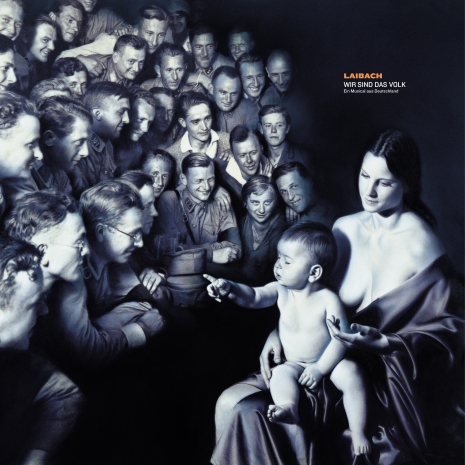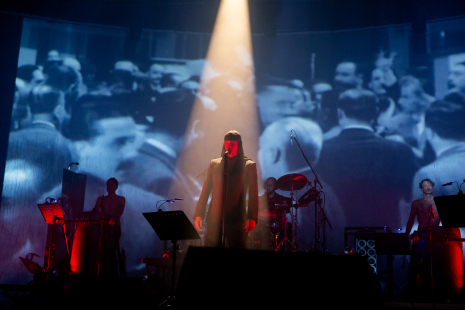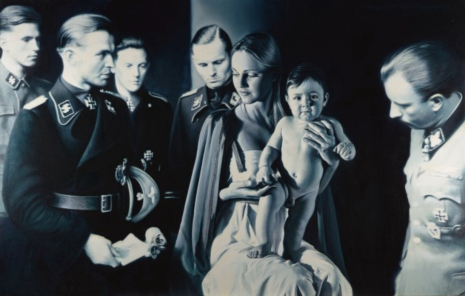
Laibach’s new album ‘Wir sind das Volk (ein Musical aus Deutschland)’
Laibach’s latest project, a musical theater production based on texts by the German playwright Heiner Müller, has been staged in Berlin, Klagenfurt, Ljubljana, Zagreb, and Hamburg. As Laibach’s early work was not enthusiastically greeted by authorities in post-Tito Yugoslavia, so Müller, whose New York Times obituary described him as an “independent Marxist,” was banned for years from the East German stage. Indeed, the director of one of his early plays was rewarded with a trip to the coal mines.
Müller’s association with Laibach dates from 1984, when the group composed music for a Slovenian production of his Quartet. Laibach and Müller met in Berlin the following year, and he suggested that they collaborate; but though he apparently did use Laibach’s music in one of his stage productions, the collaboration did not come to pass before Müller’s death in 1995.
More than twenty years later, prompted by a suggestion from Anja Quickert, the head of the Internationale Heiner Müller Gesellschaft (International Heiner Müller Society), Laibach renewed their collaboration with the dramatist. As Laibach explains its approach to creating Wir sind das Volk in the press release:
We followed Heiner Müller’s own strategy of cutting and rearranging the material, taking his text and putting it into another context, rebooting it with music, in order to drag the audience into it or alienate them from it. Music unlocks the emotions and is therefore a great manipulative tool and a powerful propagandistic weapon. And that’s why a combination of Heiner Müller, who saw theatre as a political institution, and Laibach, can be nothing else but a musical.
Laibach kindly answered a few questions about Wir sind das Volk and related matters by email.

Photo by Valter Leban
Speaking in Dresden in 2014, South Korean President Park Geun-hye proclaimed: Wir sind ein Volk! What is the difference between this assertion and Laibach’s Wir sind das Volk?
Laibach: Wir sind das Volk is a more general slogan and Wir sind ein Volk is a more particular one. When East Germans demanded the change of policy and reunification of the two Germanies in 1990, one of the slogans of the protesters at the time was Wir sind das Volk—“We are the people”—which meant that it is the people who will decide, not the authorities. When the wall between the two countries actually started to crumble, the slogan on both sides of the wall quickly changed to Wir sind ein Volk—“We are a people, one people, one nation, one state…” In this spirit, in 2014, South Korean President Park Geun-hye, speaking of the idea of reunification of the two Koreas, proclaimed Wir sind ein Volk!, which, of course, in the context of South and North Korea, means that they are one nation, violently divided in the Korean War and which, in a certain perspective of time, should be again reunited, just like Germany was.
Please tell us about the production of Laibach’s posthumous collaboration with Heiner Müller. Why, for instance, does the album open with the figure of Philoctetes?
Back in 1984 we contributed music for Heiner Müller’s Quartet, a play that was presented at the Slovenian National Theatre in Ljubljana, directed by Slovenian director Eduard Miler. This was at a time when Laibach was officially forbidden in Slovenia and Yugoslavia, and we were grateful to Eduard Miler for being brave enough to include Laibach in this theatrical piece, performed by the national institution. A good year later, in February 1985, we met Heiner Müller by coincidence in Berlin, where we had a concert at some festival, and it turned out that he was very enthusiastic about Laibach and he also proposed that we collaborate on one of his upcoming theatre productions. Unfortunately, that did not happen (in the meantime we were invited by another legendary theatre and artistic director and in fact Heiner Müller’s fierce opponent, Peter Zadek, to work the score for Shakespeare’s Macbeth in 1987—and perform in it—staged at the Deutsche Schauspielhaus in Hamburg), but we were told that Heiner Müller had apparently used some of our music in a theatre production that he worked on. Heiner Müller passed away in 1995 and only a few years ago, in 2019, we finally received an invitation from Mrs. Anja Quickert, the head of Internationale Heiner Müller Gesellschaft (H. M. Society), proposing a project based on Heiner Müller’s texts, to be premiered and performed at the HAU (Hebbel am Ufer) theatre in Berlin. The premiere of Wir sind das Volk—Ein Musical nach Texten von Heiner Müller was held on 8 February 2020 and more shows followed after the pandemic. At this point something like 10,000 people have seen the musical, in spite of the epidemics.

The poster for ‘Wir sind das Volk’
Heiner Müller is one of the most prominent post-WWII German playwrights, writers, and intellectuals, and one of the main protagonists who radically practised the denazification of Germany and ruthlessly led German Volk through the purgatory of collective guilt. Our ‘musical’ speaks of this process of denazification, but also about Heiner Müller personally, about his observation of his own life in the postwar reality of this country, divided by the Cold War. He was very fond of German national traumas as well as of the time of German patriotism and this is the topic in most of his writings. The texts and songs for the musical were selected by Anja Quickert, who also was the dramaturge and director of the show. The musical opens with an extract of Müller’s interpretation of the Philoctetes, the tragedy where he dramatizes the state’s predicament as it finds itself adopting inhumane methods in order to achieve a humane future for its citizens. In presenting the state’s point of view, Müller boldly challenges Sophocles (Philoctetes) and Gide (Philoctète), who focus their plays on the individual, not the state. Müller’s radical rewriting of the myth negotiates the question of belonging: exclusion and inclusion in a society that wants to destroy the “other” and destroys itself by tolerating only an ability to function. In the part of the text that we are using in the musical, Müller is actually talking about his own childhood traumas and that is why this text stands at the beginning of the album as well.
We hear so much about populism in politics these days. Who are the people, and what do they want? As Freud might have asked, Was will ein Volk eigentlich?
People are the suppressed majority that occasionally smells the power of victory and then they want it all.
At least one reliable source reports that Russian propaganda is simultaneously insisting that Ukrainians are racially inferior to Russians and denying that Ukrainians have a distinct nationality. If citizenship in the NSK State is not based on language, nationality, ethnicity, or race, what are the criteria?
Possession of at least one Laibach album and a good sense of humor, especially when inferiority and superiority complexes are in question. For all else we are quite flexible.

‘Epiphany (Adoration of the Magi)’ by Gottfried Helnwein (via Denver Art Museum)
How does Laibach’s approach to working on theatrical productions (Krst pod Triglavom-Baptism, Macbeth, Also Sprach Zarathustra) differ from its usual working method? Do any principles of Scipion Nasice Sisters Theatre’s work persist in Laibach’s approach?
We approach each project in a completely different way. We don’t have any creative platform or templates to use either for theatrical productions or as ‘usual working method.’ Composing is always different because most of the time we work with a slightly different combination of people, and we therefore adapt to a common operating model. Within the theatre projects it is also important who initiates it, who leads or directs it. For these productions we create the material in communication and collaboration with directors, and we try to adjust to their ideas and their vision of how the music and sound should function, as much as we can. It is true, however, that usually it is best that producers and directors give us a totally free hand for the best results.
Is it possible to express one’s personality in Schlager music or Volkslieder without ruining the performance? For instance, giving voice to the German national character seems to suit Heino so well because he only uses emotions as signs of filial piety. “Folk music” in the US these days, on the other hand, consists almost entirely of people crying about their hurt feelings.
They really do it in pop and rock music too, there is a lot of ‘crying’ and trading in emotions in pop and rock music tradition. In principle we do not see much difference between pop-rock music and Schlager music or Volkslieder in Germany. In the context of the German national character, Heino, who deals with emotions perfectly, as well as Kraftwerk, who actually took a lot of their inspiration from Volkslieder and Schlager music—their versions are not contaminated by emotional hyperinflation. In America, on the other hand, it’s hard to imagine popular music—with the exception of hip hop and rap—without such emotional exploitations… What would Presley, Prince, Bon Jovi, Bruce Springsteen, Whitney Houston, Dolly Parton or Taylor Swift (etc., etc.) be without their hurt feelings?
Singing in 1985, U.S.A. for Africa proclaimed: “We Are the World.” Is Laibach the world, too?
We are Africa and the Universe.
Previously on Dangerous Minds:
Become a citizen of Laibach’s global state
Laibach’s opening act: a man chopping wood with an axe
Laibach’s nightmarish new short film, ‘So Long, Farewell’: a Dangerous Minds premiere